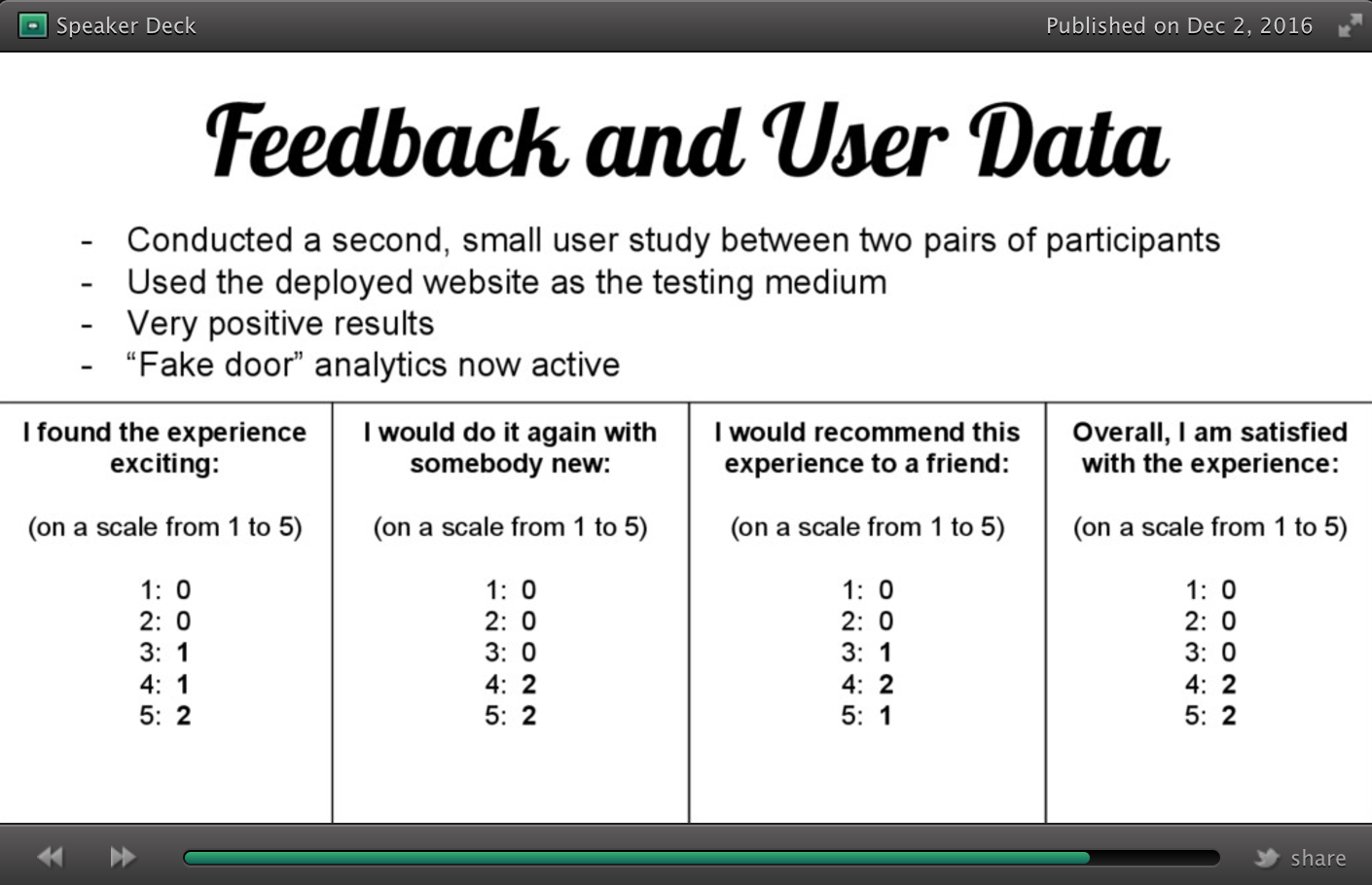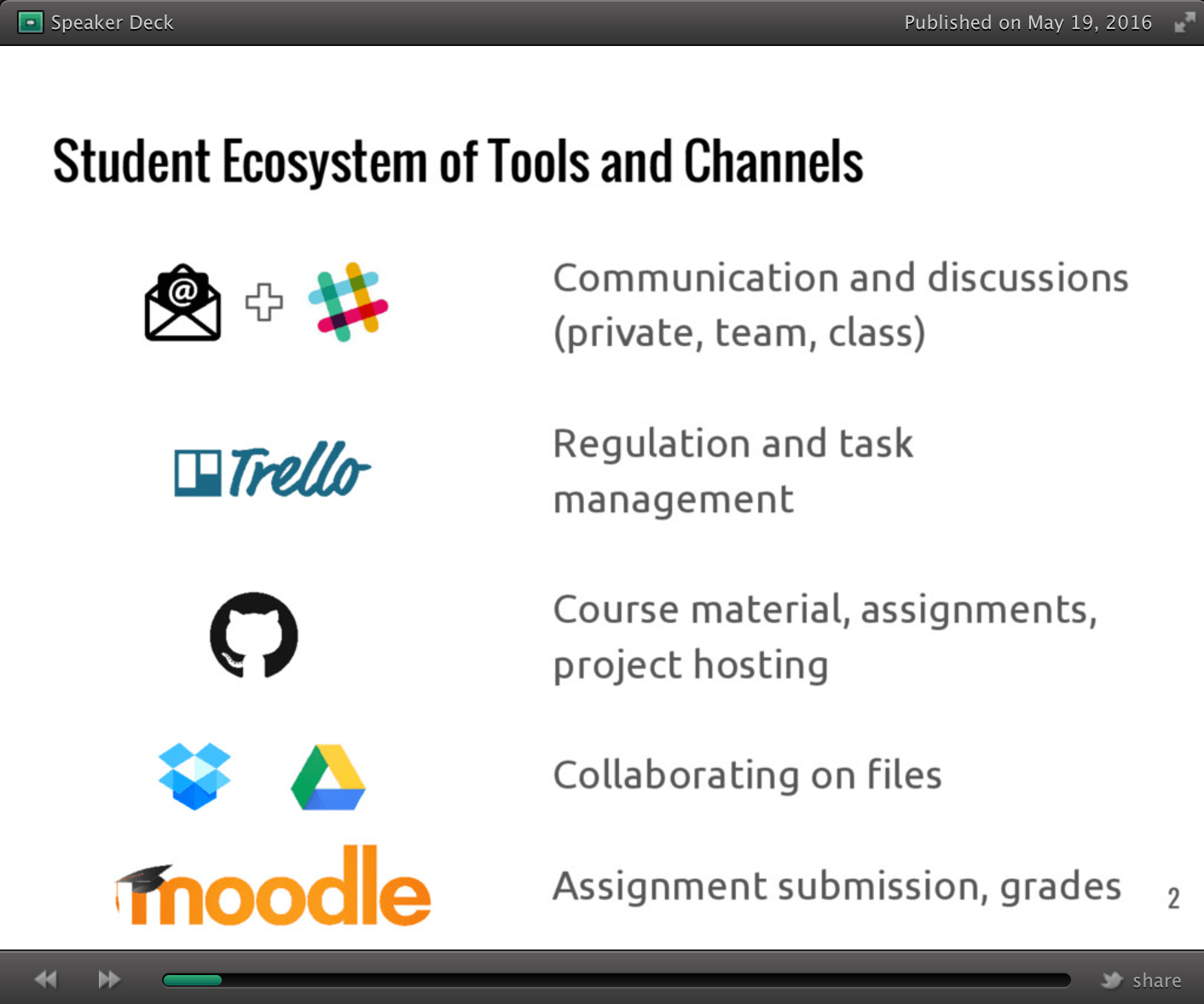GitHub Issues and user testing as authentic assessment
A course organized around users, not exams In his Startup Programming course at the University of Victoria, Alexey Zagalsky asks students to design products based on user needs. Working together…
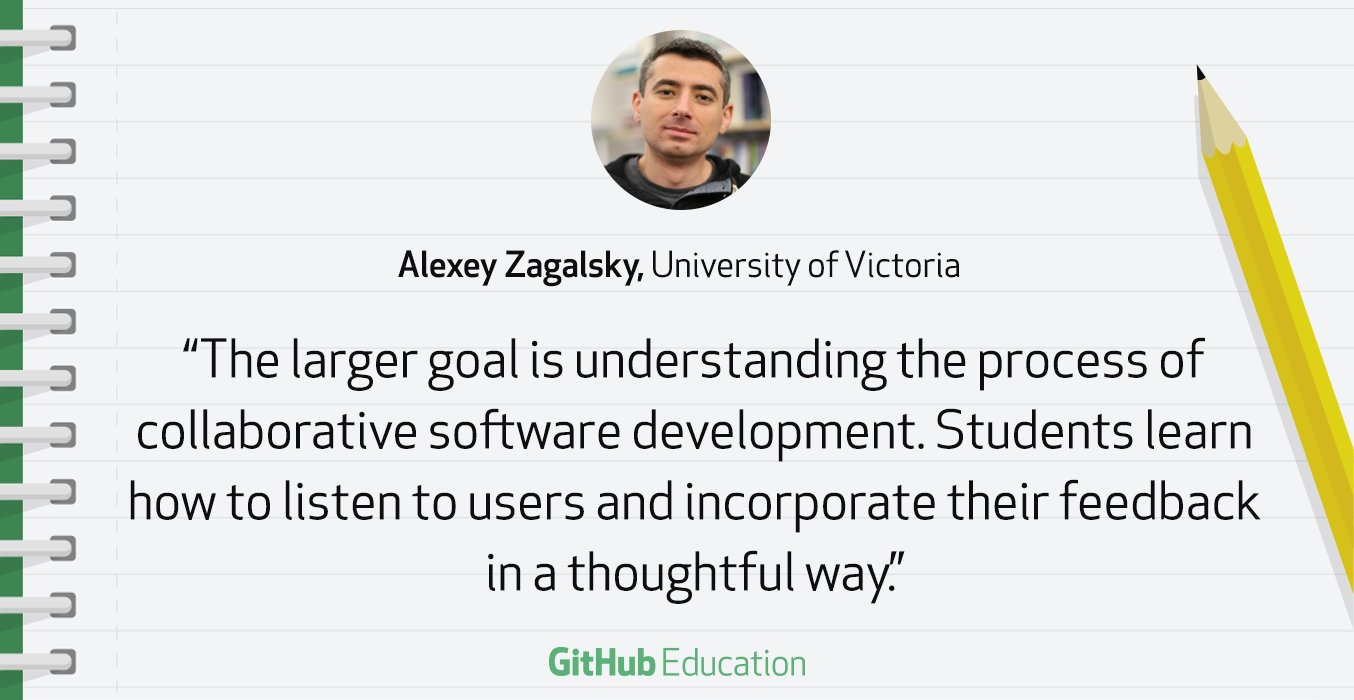
A course organized around users, not exams
In his Startup Programming course at the University of Victoria, Alexey Zagalsky asks students to design products based on user needs.
Working together in teams of four to six, students deliver pieces of the project at key milestones:
- Milestone 0: Generate ideas and select a product
- Milestone 1: Present a proof of concept
- Milestone 2: Release a live demo
- Milestone 3: Launch public beta with user feedback integrated
He ties the course to the software industry by inviting experienced mentors from local startups to evaluate student work. Alexey says:
While the end-products are terrific, the larger goal is understanding the process of collaborative software development. Students learn how to listen to users and incorporate their feedback in a thoughtful way.
User testing as assessment
After students ship a working prototype, the next milestone requires user testing with their target audience. And of all the challenges over the semester, students wrestle the most with addressing user feedback:
The most frequent point of failure is not understanding their users. And they wouldn’t see where they’ve failed until they try to get people to use their product.
But being able to listen to feedback, and implement it as part of the design process, is quite important. First, to learn, but also to get a job, because it’s not about writing code but actually understanding what needs to be built and how. One student now works at Amazon. Two or three work at Microsoft. One has gone on to become a UX designer. So many students really benefitted from this approach.”
Feedback through GitHub issues
Alexey admits:
You’d be surprised how often students get stuck and never ask for help
So occasionally he pops into student repositories to see what’s going on, test the code himself, and spot mistakes before it’s too late.
If he spots a bug, he’ll open an issue, outline what’s amiss and upload screenshots of the behavior.
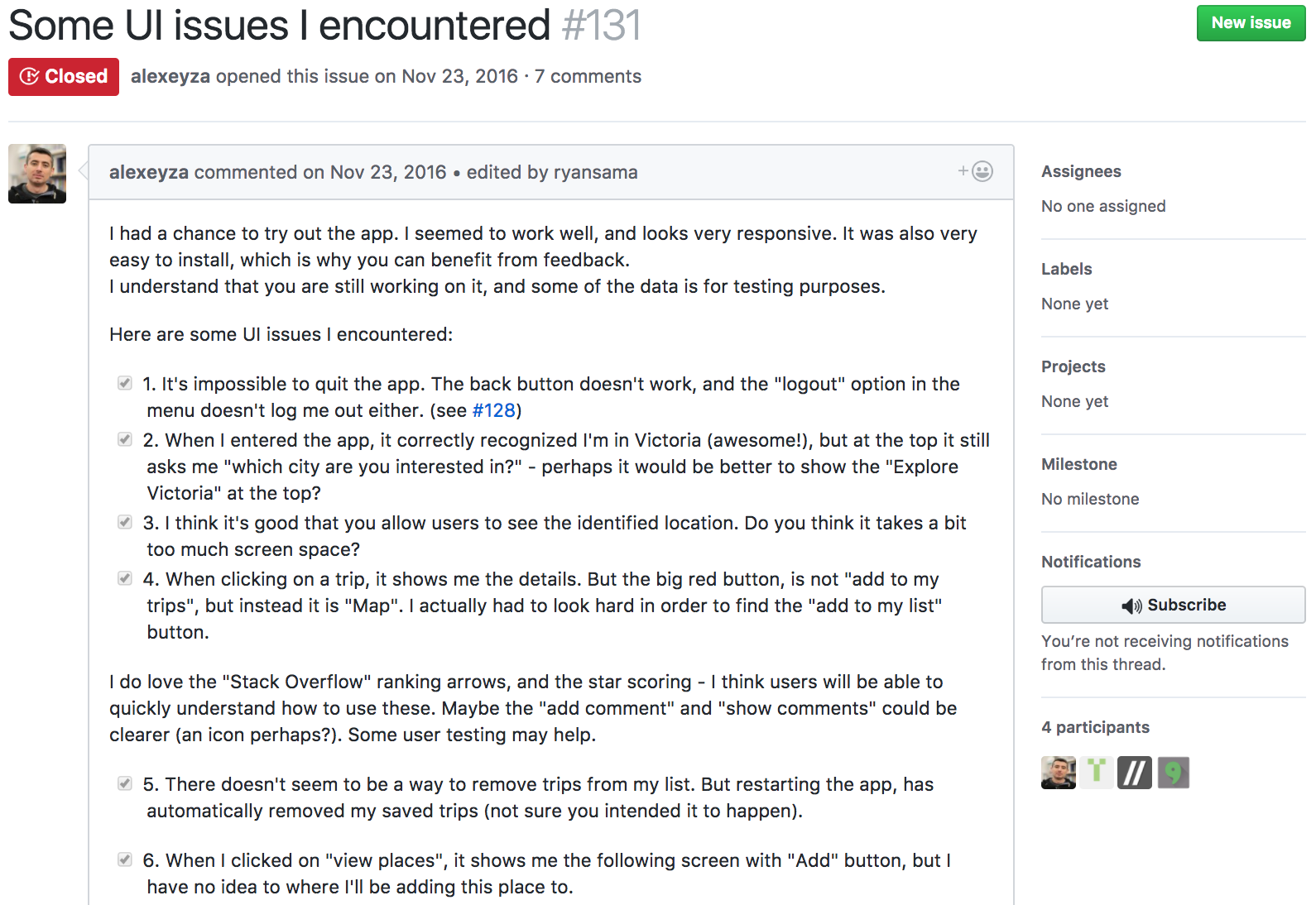 From the fall 2016 student project DayTomato.
From the fall 2016 student project DayTomato.
Next, he works with the team to think about potential solutions:
One team wasn’t sure which metrics they should track using Mixpanel. I suggested they track certain metrics at the prototyping, release, and iteration phases of their project. I gave them some perspective on how to prioritize and implement.
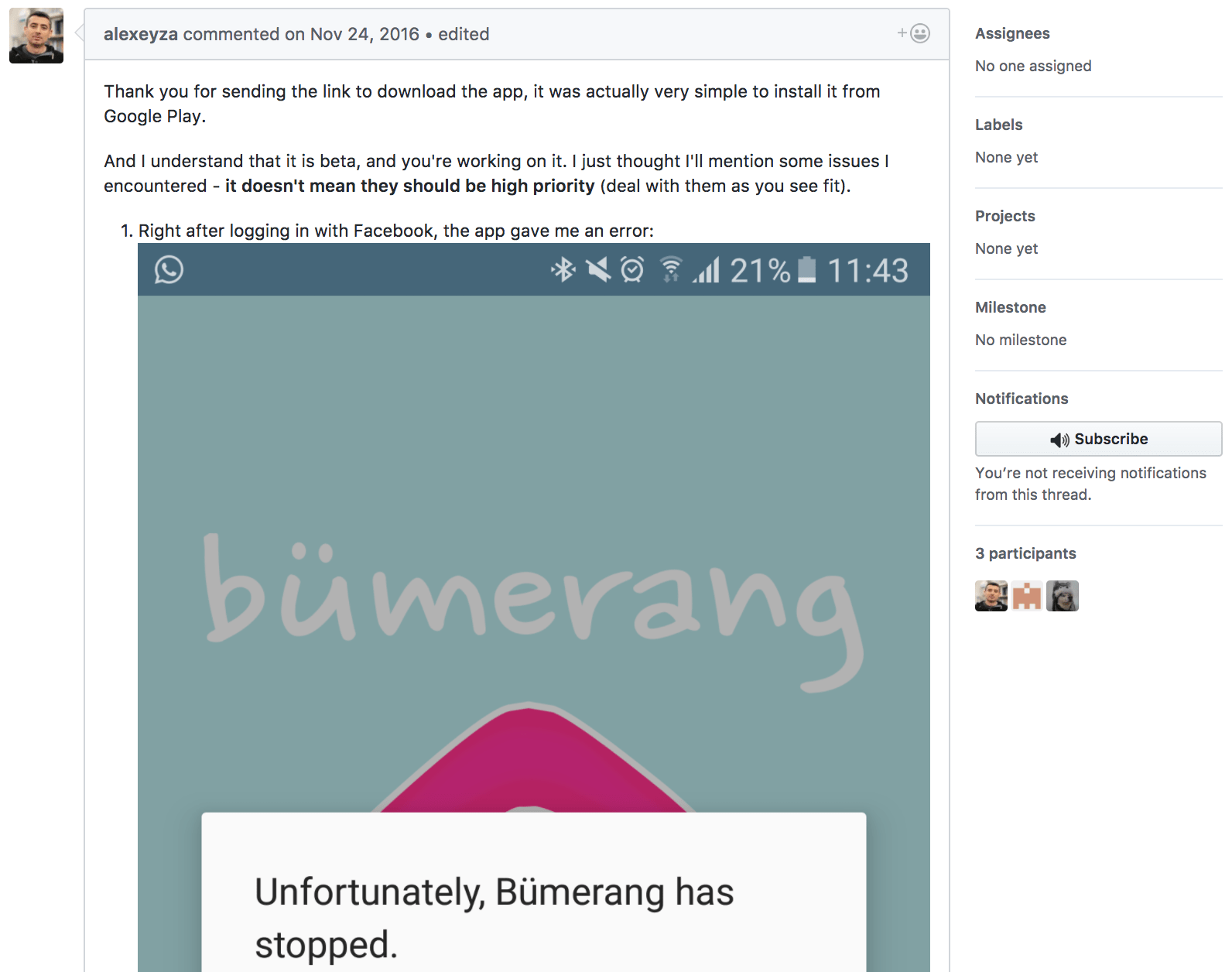 From another student group, who made a borrowing and lending application called Bümerang.
From another student group, who made a borrowing and lending application called Bümerang.
Iteration for intrinsic motivation
In an Agile classroom, the goal is not the right answer to the problem, but knowing which problem to take on first, and how to solve it in the right increments.
This course isn’t about assessing a final product and saying, ‘You did that wrong.’ Our in-progress ‘checks’ show the students we care about their work; it’s not just some assignment they need to submit for a grade. The way we care makes them more motivated in turn.”
Another student project, SmirkSpace, reflecting on its user feedback for Milestone 3.
A collaborative classroom practice
Alexey’s research focuses on how to use industry tools to build software together, to help his students develop the social ties, trust and curiosity to sustain a successful software career.
So he uses GitHub to enable discovery, design, and collaboration:
It’s about changing the way people work: students and educators, students among themselves, and education’s relationship to industry.
I am working from the hypothesis that software built collaboratively, with many voices and opinions, will improve the collective good of future software, period.
How to implement this classroom practice
Alexey documents all of his course designs and publishes the results of his research on student experiences with GitHub, Slack, Stack Overflow and other real-world tools.
Here’s a recent talk on his course design that discusses the benefits (and drawbacks) of using social tools in the classroom:
This is a post in our “Teacher Spotlight” series, where we share the different ways teachers use GitHub in their classrooms. Check out the other posts:
- Invest in tools students can grow with: GitHub and RStudio for data science at Duke University, featuring Mine Çetinkaya-Rundel
- How CS50 at Harvard uses GitHub to teach computer science, featuring David Malan
- GitHub Classroom for AP Computer Science at Naperville North High School, featuring Geoff Schmit
- Real-time feedback for students using continuous integration tools, featuring Omar Shaikh
Join this week’s discussion in the community forum: How do you use issues in your class?
Tags:
Written by
Related posts

Students: Start building your skills with the GitHub Foundations certification
The GitHub Foundations Certification exam fee is now waived for all students verified through GitHub Education.

Announcing GitHub Secure Open Source Fund: Help secure the open source ecosystem for everyone
Applications for the new GitHub Secure Open Source Fund are now open! Applications will be reviewed on a rolling basis until they close on January 7 at 11:59 pm PT. Programming and funding will begin in early 2025.

Software is a team sport: Building the future of software development together
Microsoft and GitHub are committed to empowering developers around the world to innovate, collaborate, and create solutions that’ll shape the next generation of technology.
